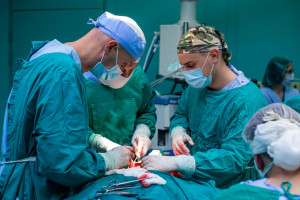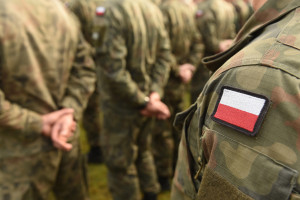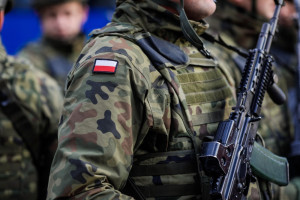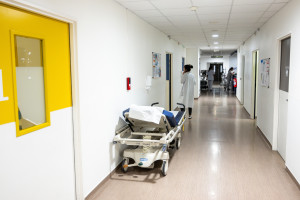Health as a pillar of national security. Poland must be prepared for the crisis. The report will be released in August.


 Authors: Katarzyna Mieczkowska ; Klara Klinger • Source: Rynek Zdrowia • Added: August 6, 2025 17:40 • Updated: August 6, 2025 17:44
Authors: Katarzyna Mieczkowska ; Klara Klinger • Source: Rynek Zdrowia • Added: August 6, 2025 17:40 • Updated: August 6, 2025 17:44
You can never be fully prepared for war. But you can—and must—prepare. Has the healthcare sector done enough in this regard? We checked the situation. August 27th saw the premiere of the report "Safe in Crisis," prepared by the Military Medical Institute, Health Market, and CIS Economic Trends.
- In these turbulent times, healthcare is one of the key areas requiring crisis-proofing. What should we pay particular attention to? And what should we implement first?
- In the report by WIM, Rynek Zdrowia, WNP Economic Trends "Safe in times of crisis. How to take care of the health of citizens and soldiers when the world is unstable?", which is scheduled for publication on August 27, we will answer these questions.
- The topic of safety in the context of the healthcare system is also relevant to industry. We discussed it during both the Health Challenges Congress 2025 and the European Economic Congress (EEC) 2025 in Katowice.
The report "Safe in Crisis: How to Ensure the Health of Citizens and Soldiers When the World is Unstable?" is a response to the high awareness of the importance of health for the state's resilience in Poland, comparable to modern military equipment, and the simultaneous lack of sufficient action in this regard.
This publication will address key questions regarding the development of effective and crisis-resistant battlefield medicine, protecting soldiers and civilians in the face of urban conflicts, where the boundary between the battlefield and civilian zone becomes fluid. It also addresses the preparedness of the system, hospitals, and personnel to potential threats. And it also addresses the pharmaceutical industry.
In the report we will present an analysis of, among others:
- managing the healthcare system in worst-case scenarios,
- availability of qualified medical personnel ,
- taking care of soldiers' health,
- the effectiveness of field hospitals , mobile rescue points and telemedicine during the crisis,
- as well as the need for civil-military cooperation and action plans with the European Union.
- They also indicate what is already working and what urgently requires improvement in the Polish medical care system .
One of the key topics is also the preparedness of industry and society to face new threats.
The topic of security in the context of the healthcare system and the challenges associated with it was present during both the Health Challenges Congress (HCC) 2025 and the European Economic Congress (EEC) 2025 in Katowice .
During the HCC, Deputy Minister of Health Katarzyna Kacperczyk said that health is no longer the exclusive domain of public services. It has become an element of broader security, state sovereignty, and the security of entire societies.
"We must create a system that will respond not only during periods of stability, but above all in unpredictable, crisis situations —from pandemics to wartime operations. The healthcare system must function like clockwork," Minister Kacperczyk emphasized during the Health Challenges Congress.
Meanwhile, during the European Economic Congress (EEC), experts cited the lack of pharmaceutical sovereignty as one of the most frequently cited threats. Poland is only able to meet one-third of the demand for essential medicines, and imports of active pharmaceutical ingredients (APIs) make the domestic system dependent on the global political and logistical situation .
"Since the COVID-19 pandemic, which set a model for other member states and led to the collapse of supply chains, we have all realized that the availability of medicines is no longer a given, " said Katarzyna Piotrowska-Radziewicz , Director of the Department of Drug Policy and Pharmaceuticals at the Ministry of Health. "We struggled to get the panel on drug safety in the context of military security passed in Brussels. But what seems obvious to us has long been difficult for the European Commission to accept."
Aleksander Michalski, Commander of the Military Clinical Hospital with the SPOZZ Polyclinic at the Military Hospital in Krakow , also pointed to the dramatic situation from the perspective of daily practice: "On average, once a month, our pharmacy reports shortages. We have to swap products, experiment, and improvise. This isn't the future—it's the present."
Experts from the Polish Association of Pharmaceutical Industry Employers, Krzysztof Kopeć and Barbara Misiewicz-Jagielak, pointed out that there is a need to coordinate activities with the Chancellery of the Prime Minister, specific decisions and support programs for drug producers – not just declarations.
"Every country defends itself with all its resources – not just tanks. We must decide what is our priority: medicine, food, energy? Only with this knowledge can we invest and make responsible decisions," emphasized General Professor Grzegorz Gielerak , director of the Military Institute of Medicine.
Medical representatives also speak in a similar vein. Draginja Nadazhdin , director general of Doctors Without Borders, warned during the EEC against the false belief that health care during wartime is limited to hospitals and ambulances :
"Armed conflicts cause systems to break down. The threat of drug resistance and treatment disruptions is growing. We must strive for flexible and equitable health systems that are resilient to crises. And we must respect humanitarian law – without it, the protection of civilians and medical personnel will be a fiction."
During the debates, experts emphasized the crucial importance of developing a national drug safety strategy, pointing out that Poland meets only one-third of its demand for essential medicines, which makes the country dependent on global supply chains. They emphasized the need for investment in domestic drug and API production and the creation of strategic reserves. International cooperation, particularly with the EU and NATO, through harmonization of procedures and joint exercises, is also crucial to increasing system resilience.
The WIM, Health Market and WNP Economic Trends report will provide specific conclusions and recommendations in each area.
Copyrighted material - reprint rules are specified in the regulations .
rynekzdrowia











